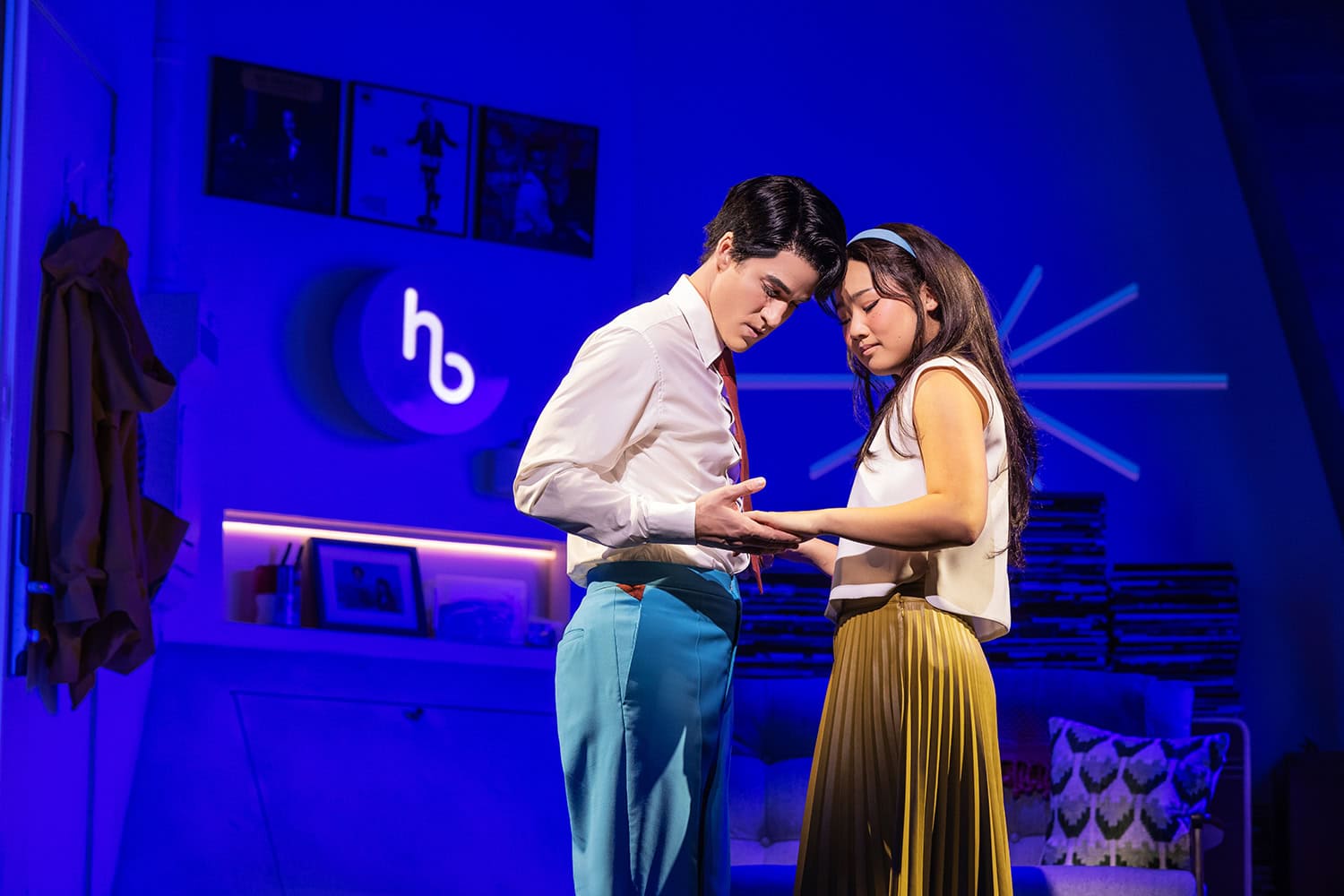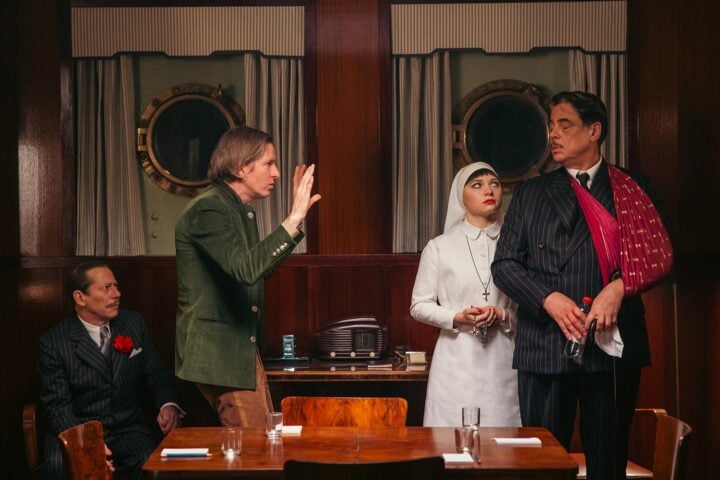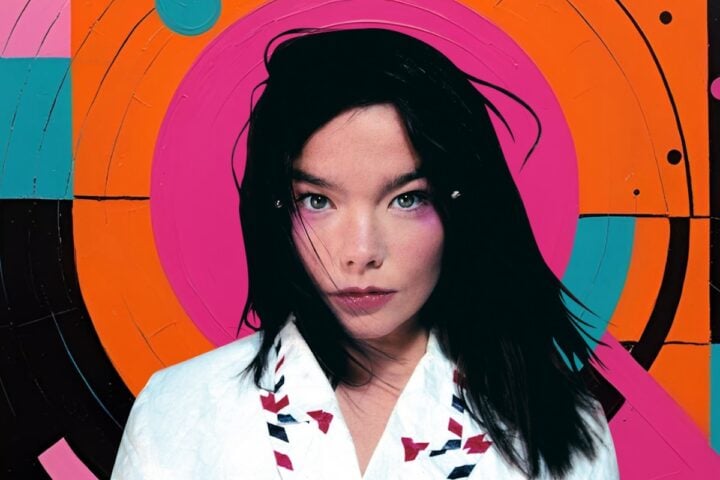Sutton Foster, Bernadette Peters, Lea Salonga, Idina Menzel, and (if I may invoke her name) Patti LuPone would have been a monster of an all-star Tony nomination lineup in any other season. But those past winners, each a major force in musical theater history, missed the ballot despite their (almost uniformly) strong showings on Broadway this year.
If it’s uncouth to define a season by who didn’t make the Tony cut, that group of also-rans is a sign of the riches on offer. And if this season was in part distinguished by the arrival of a cavalcade of Hollywood A-listers, the nominations also highlight how many Broadway mainstays have set up residence to deliver excellence year after year: Nominees Jonathan Groff, Danya Taymor, Kara Young, Justin Peck, and Dede Ayite all won Tonys last season.
So if not quite every gem of the season is in the mix this Sunday (for one, the glorious Once Upon a Mattress didn’t receive a single nomination), the Tonys will still offer a chance to celebrate a jam-packed year. “The ending’s not the most important part,” sings HelperBot Oliver in Maybe Happy Ending, this season’s biggest surprise and delight and the show best poised to make a clean sweep. “But as endings go, ours is not so bad.”
Best Performance by a Leading Actor in a Play
George Clooney, Good Night, and Good Luck
Cole Escola, Oh, Mary!
Jon Michael Hill, Purpose
Daniel Dae Kim, Yellow Face
Harry Lennix, Purpose
Louis McCartney, Stranger Things: The First Shadow
Nominators did some of the preliminary work here, clearing out most of a cadre of celebrities: Robert Downey Jr., Denzel Washington, and Jake Gyllenhaal were left off the list. So it’s apparently a showdown between George Clooney and Cole Escola. But it’s not really much of a race since the impishly irreverent Escola has become the darling of Broadway this season, for their off-stage madcap interviews as much as for their on-stage shenanigans. Escola will win, but it’ll be the third case in two years of the Tonys forcing non-binary eventual winners to choose a binary gender in order to be considered.
Best Performance by a Leading Actress in a Play
Laura Donnelly, The Hills of California
Mia Farrow, The Roommate
LaTanya Richardson Jackson, Purpose
Sadie Sink, John Proctor Is the Villain
Sarah Snook, The Picture of Dorian Gray
It’s hard not to admire the audacious Sarah Snook for playing nearly 30 characters (some pre-taped) in The Picture of Dorian Gray. She’s terrific, and she’ll win. But what Laura Donnelly accomplished last fall in The Hills of California, taking on a mere two roles but rendering herself—accent, posture, facial expressions—remarkably unrecognizable in the play’s second half, was next-level. Dorian Gray, though lots of fun, was never moving, but Donnelly ensured that The Hills of California was a harrowing, devastating ride.
Best Performance by a Featured Actor in a Play
Glenn Davis, Purpose
Gabriel Ebert, John Proctor Is the Villain
Francis Jue, Yellow Face
Bob Odenkirk, Glengarry Glen Ross
Conrad Ricamora, Oh, Mary!
This category will likely come down to Conrad Ricamora, matching Cole Escola’s brand of silly as a very queer Abraham Lincoln, and Francis Jue, reviving a tragicomic role, a version of the playwright’s father that he first played two decades ago off-Broadway. A win for either would be the second time (after BD Wong in 1988) that any Asian American performer has won a Tony for a non-musical play. Only three Asian American actors have ever won Tonys, period, and with Darren Criss and Nicole Scherzinger in contention, there’s a good chance that number will double in a single ceremony. This category will be close, but it will be the veteran Jue by a hair.
Best Performance by a Featured Actress in a Play
Tala Ashe, English
Jessica Hecht, Eureka Day
Marjan Neshat, English
Fina Strazza, John Proctor Is the Villain
Kara Young, Purpose
This is a stunner of a category and a particularly tricky one to predict, as all five women give nuanced performances and will each find strong support. I’d cast my vote for Marjan Neshat, the glorious actress finally making her Broadway debut as an Iranian teacher prepping her students for the TOEFL (English language) exam while trapped between two worlds. Both Neshat and Jessica Hecht are central characters in their ensemble plays, bordering on lead roles, and voters may be eager to award Hecht for her third nomination. But the irrepressible Kara Young is on a tear: This is her fourth nomination in this category in four seasons (she won last year for Purlie Victorious), and she’s as hilarious and moving as ever in Purpose. Look for voters to stay forever Young and make the four-time nominee a two-time winner.
Best Performance by a Leading Actor in a Musical
Darren Criss, Maybe Happy Ending
Andrew Durand, Dead Outlaw
Tom Francis, Sunset Boulevard
Jonathan Groff, Just in Time
James Monroe Iglehart, A Wonderful World: The Louis Armstrong Musical
Jeremy Jordan, Floyd Collins
Another massively competitive category that could conceivably go in five directions (it’s hard to imagine a win for James Monroe Iglehart, a surprise nominee, in the long-closed A Wonderful World). Jonathan Groff is wildly appealing as Bobby Darin in Just in Time, and Jeremy Jordan is at his career best as the ever-yodeling Floyd Collins. But Darren Criss will likely ride the wave of goodwill for Maybe Happy Ending to a win here. He’s also a producer on the little show, and seems to be fighting hard for its survival across the board.
Best Performance by a Leading Actress in a Musical
Megan Hilty, Death Becomes Her
Audra McDonald, Gypsy
Jasmine Amy Rogers, Boop! The Musical
Nicole Scherzinger, Sunset Boulevard
Jennifer Simard, Death Becomes Her
For most of the season, it’s been Audra McDonald versus Nicole Scherzinger. But could this be a three-way race? Jasmine Amy Rogers vanquished both of those rivals in an all-gender category to win the Outer Critics Circle Award last month, and she and McDonald both won in a larger category at the Drama Desk Awards. Tony voters love an unexpected ingénue (just look at Maleah Joi Moon last season), and while McDonald and Scherzinger have their detractors, I haven’t heard a single negative comment about Rogers’s joyfully empowered take on Betty Boop. But one of these women is giving the best performance I have ever seen live in perhaps the greatest musical theater role ever written. When all’s said and done, we’ll keep the superlatives coming as McDonald extends her record as the most Tony-winning performer in history.
Best Performance by a Featured Actor in a Musical
Brooks Ashmanskas, Smash
Jeb Brown, Dead Outlaw
Danny Burstein, Gypsy
Jak Malone, Operation Mincemeat
Taylor Trensch, Floyd Collins
It’s a delight to see Taylor Trensch snag his first nomination for his nearly non-singing performance as the compassionate journalist Skeets Miller in Floyd Collins. But the winner here will either be Danny Burstein, who’s astonishing in bringing warm-hearted, doomed optimism to Gypsy’s Herbie (his chemistry with co-star Audra McDonald is electric), or Jak Malone, cycling through likely dozens of roles in the peripatetic Operation Mincemeat. The latter also stands out for his tear-jerking rendition of “Dear Bill,” in which he plays a secretary reflecting on her lost husband. Burstein rose to the tip-top level of Gypsy’s material (and would get my vote), but Malone transcended the middling Operation Mincemeat.
Best Performance by a Featured Actress in a Musical
Natalie Venetia Belcon, Buena Vista Social Club
Julia Knitel, Dead Outlaw
Gracie Lawrence, Just in Time
Justina Machado, Real Women Have Curves
Joy Woods, Gypsy
Joy Woods is heart-wrenching in a role that won Laura Benanti the Tony in 2008, and Julia Knitel delightfully plays a bevy of characters in Dead Outlaw, including a teenage girl sweetly confiding her secrets to a mummified corpse. But I think this category belongs to Natalie Venetia Belcon, the commandingly austere heart of Buena Vista Social Club. Her glare is withering, her poise is frightening, and her voice is astonishing. When her Omara Portuondo (a real-life, still-living Cuban singer) breaks out into a grin and a dance, it’s a bolt of joy.
Best Direction of A Play
Knud Adams, English
Sam Pinkleton, Oh, Mary!
Sam Mendes, The Hills of California
Danya Taymor, John Proctor Is the Villain
Kip Williams, The Picture of Dorian Gray
Last year, Danya Taymor’s win for The Outsiders over Maria Friedman (Merrily We Roll Along) was the ceremony’s big shocker. This year, don’t be surprised when she takes home her second Tony (tying her Aunt Julie!) for an equally assured production. Kip Williams and Sam Pinkleton may both be overshadowed by their star actors, Sarah Snook and Cole Escola, respectively, who’ve become synonymous with their shows. And though Knud Adams (my pick) and Sam Mendes provided the season’s most intimate, intricate stagings, those shows have both long closed. That leaves a deserving Taymor, who’s gotten her young ensemble cast all on the same page in telling a breathless, powerful story together.
Best Direction of a Musical
Saheem Ali, Buena Vista Social Club
Michael Arden, Maybe Happy Ending
David Cromer, Dead Outlaw
Christopher Gattelli, Death Becomes Her
Jamie Lloyd, Sunset Boulevard
This one’s a two-way race between the directors of the likely winners for best musical and best revival: Michael Arden and Jamie Lloyd. Sunset Boulevard draws attention to its director like few musicals in recent memory (merch from his production company even appears in the video projections during the show), but Lloyd’s high-concept re-envisioning has been divisive. Those who don’t like Sunset Boulevard will coalesce around the universally beloved Arden’s playful and video game-like staging. And since some Sunset Boulevard fans may also vote for Arden (nearly everyone likes Maybe Happy Ending), the robot invasion will sweep through this category. Don’t feel bad for Lloyd if it does, because he’ll be back next season with doubtless more dubious decisions with Waiting for Godot and maybe an Evita too.
Best Original Score
Will Aronson and Hue Park, Maybe Happy Ending
Noel Carey and Julia Mattison, Death Becomes Her
David Cumming, Felix Hagan, Natasha Hodgson, and Zoë Roberts, Operation Mincemeat
Joy Huerta and Benjamin Velez, Real Women Have Curves
David Yazbek and Erik Della Penna, Dead Outlaw
We don’t need a HelperBot to predict this one. Will Aronson and Hue Park’s utterly gorgeous, strings-drenched score is anything but robotic. In fact, it may well be the loveliest musical theater score since Adam Guettel’s The Light in the Piazza 20 years ago. Engrave it now.
Best Book of a Musical
Will Aronson and Hue Park, Maybe Happy Ending
David Cumming, Felix Hagan, Natasha Hodgson, and Zoë Roberts, Operation Mincemeat
Itamar Moses, Dead Outlaw
Marco Pennette, Death Becomes Her
Marco Ramirez, Buena Vista Social Club
If someone’s going to steal a Tony from Maybe Happy Ending’s creative team, it’s here. The question is, who? Dead Outlaw has a totally surprising and brilliantly original structure and style. Death Becomes Her lands zinger after zinger with deadly precision. And Operation Mincemeat has won over many with its Monty Python-esque farcical approach to military history. But that many potential upstarts will split the vote in too many directions. Maybe Happy Ending’s wry heartbreaker of a script and story will still pull this one out.
Best Orchestrations
Will Aronson, Maybe Happy Ending
Bruce Coughlin, Floyd Collins
David Cullen and Andrew Lloyd Webber, Sunset Boulevard
Marco Paguia, Buena Vista Social Club
Andrew Resnick and Michael Thurber, Just in Time
The orchestrations for Floyd Collins and Sunset Boulevard sound fantastic, but they’re actually beefed-up versions of the instrumentation from the ’90s. And the Buena Vista Social Club band already have received a special Tony this year (those musicians’ extraordinary improvisations surely have as much impact on the score as what’s in Paguia’s charts). That leaves Maybe Happy Ending and Just in Time. (Michael Thurber’s own rousing score for Goddess can now be heard at the Public and might well contend if that show transfers next season.) It’s the rare musical theater composer who independently orchestrates their own music, and Will Aronson’s instrumentation, especially his lush and playful strings writing, is as essential to the storytelling as the melody and lyrics. Give the guy three Tonys, because he’s earned it.
Best Choreography
Joshua Bergasse, Smash
Camille A. Brown, Gypsy
Patricia Delgado and Justin Peck, Buena Vista Social Club
Christopher Gattelli, Death Becomes Her
Jerry Mitchell, Boop! The Musical
Boop!: The Musical, Death Becomes Her, and Buena Vista Social Club are at three corners of a diverse dance triangle: an ebullient old-school tap-and jazz landscape versus a serpentine, vogue-infused palate versus a tribute to Cuban rhythms and movement. All three would be worthy winners, but I’ll give the edge to Patricia Delgado and Justin Peck. Buena Vista Social Club is a musical about the power of music and the show’s choreography renders dance an inextricable part of how that music hits home.
Best Revival of a Play
Eureka Day
Our Town
Romeo + Juliet
Yellow Face
The two most talked-about revivals this season—Othello and Glengarry Glen Ross—didn’t make the cut. That leaves us with four productions that have closed. I think I’d cast my vote for Kenny Leon’s imperfect but intermittently moving production of Our Town, but this race is between Eureka Day and Yellow Face. The latter is impressively subtle in its satire, but Eureka Day pulled out all the comedic stops in a crowd-pleasing scene with projections of an explosively emoji-ridden livestream chat. Voters will give one last thumbs up to Eureka Day.
Best Play
English
The Hills of California
John Proctor Is the Villain
Oh, Mary!
Purpose
What a category. These five plays couldn’t be more different from each other, each exemplifying the genres in which the playwrights work. For much of the season, I assumed Oh, Mary!, a financial juggernaut and word-of-mouth sensation, would be undefeatable without a single play for voters who felt weird about voting for a light entertainment to coalesce around. Now I think we have one: John Proctor Is the Villain is just as fun as Oh, Mary!, until it isn’t, and playwright Kimberly Belflower’s wise mix of adolescent amusing awkwardness and fiercely empowering camaraderie make this show both blaringly funny and blazingly important. I’m still holding out hope that English, the beloved Pulitzer Prize winner that is a master class in storytelling as lithe and gentle as its French piano underscoring, can sneak out a victory. (I wonder whether The Hills of California and Purpose may be hampered by being slightly less successful successors to their playwrights’ more popular Broadway outings.) But as Shaina Taub’s suffragists sang last season, “The young are at the gates.” If so, a win for John Proctor Is the Villain will prove it.
Best Revival of a Musical
Floyd Collins
Gypsy
Pirates! The Penzance Musical
Sunset Boulevard
I was unconvinced by the entirety of the Sunset Boulevard project, and I just don’t buy that Jamie Lloyd and his collaborators actually respect the show itself. Gypsy, on the other hand, is about as loving a revival as you could hope for, with Audra McDonald offering a blisteringly definitive Mama Rose and director George C. Wolfe poignantly reimagining how this historical musical can make crystalline sense through a newly Black lens. But Sunset Boulevard, in its brashness (and in its holding up traffic for the live video feed of the title song eight times a week), has demanded attention in a way that will likely pay off come Sunday.
Best Musical
Buena Vista Social Club
Death Becomes Her
Dead Outlaw
Maybe Happy Ending
Operation Mincemeat
Maybe Happy Ending nearly didn’t have the finances together to start performances in the fall. In the early weeks, grosses were perilously low. The show’s days seemed numbered. As a theater critic, I’ve never been prouder of the way the critic community came together in harmony on November 12 to sing this little show’s praises. The critical acclaim, warm word of mouth, and successful social media strategy reversed the show’s fortunes by Christmas. Dead Outlaw is a wild, unpredictable ride with a delightful ensemble cast, and it could easily take home the prize in another year (it won all the precursor awards in its off-Broadway run last season). And Death Becomes Her delivers the kind of sparkling, snappy comedy on a grand scale that audiences rightly lap up. But Maybe Happy Ending, in its marriage of wit and pathos, and of Korean and American storytelling influences, is a cut above. It’s an utterly magical work of theater, and it’ll be an undoubtedly happy ending for the Maybe Happy Ending team on Tony night.
Since 2001, we've brought you uncompromising, candid takes on the world of film, music, television, video games, theater, and more. Independently owned and operated publications like Slant have been hit hard in recent years, but we’re committed to keeping our content free and accessible—meaning no paywalls or fees.
If you like what we do, please consider subscribing to our Patreon or making a donation.





